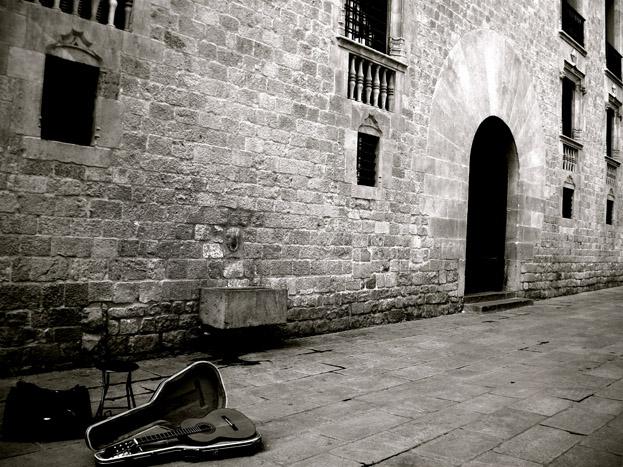Pause and Savor

Photo by Chiara Olivi '11 taken in Barcelona while she was studying at the Dickinson program in Malaga, Spain.
By MaryAlice Bitts-Jackson
A series of high-profile poetry readings shines a spotlight on the Dickinson in Málaga program by immersing Dickinson study-abroad students in an important aspect of Spanish life. Led by Program Director and Associate Professor of Spanish Jorge Sagastume with help from student interns, the events have garnered widespread media attention and -support from the University of Málaga and the Spanish Ministry of Culture.
The heart of the programming is an ongoing series of readings by poets that include Swedish Nobel Laureate Tomas Tranströmer; José Manuel Caballero Bonald of Andalusia, recipient of Spain’s prestigious Cervantes Award; and Carol Ann Johnston, professor of English at Dickinson.
“We received a great response,” said Arden Baker ’14, an environmental-studies major who, along with fellow Málaga intern Rebecca Ray ’14, wrote artist biographies, helped translate poems as needed and encouraged fellow students at Dickinson’s partner university in Málaga to attend.
Study-abroad students Emma Rodwin ’14, Caroline O’Neill ’14 and Michele Hovy ’14 brought a famed Greek poet into the limelight during an April event presented collaboratively by Dickinson and the University of Málaga’s classics and translations department. The students delivered public readings of “Days of 1903” by Constantine Cavafy (1863–1933) in English, Spanish and Greek.
A three-day conference, organized by Sagastume, created much buzz in July. Scholars from around the world gathered to discuss the novels of Miguel de Cervantes, best known as the author of Don Quixote, whose pivotal work The Exemplary Novels and Other Texts marks its 400th anniversary this year.
In addition to Sagastume, Professor of Spanish Alberto Rodríguez was among the scholars who presented.
At the conference’s close, a subsidiary of the Spanish Ministry of Culture took the celebration on the road, presenting readings of Cervantes’ poems in neighboring towns. Student interns will work with Sagastume throughout the academic year as he edits the conference papers, which will be compiled into a book and published next spring.
Johnston notes that artistic explorations such as these can have sweeping effects, since poetry not only compels us to explore universal experiences but also changes the way we process those experiences. “Poetry causes you to slow down and take the time to think deeply and appreciate the unraveling of life as it comes, which is hard for [American] students to do, because we’re used to things going by so fast,” she says.
It’s also a natural aspect of the Spanish study-abroad experience, she adds, noting that pausing and savoring are actively encouraged in Spanish culture. “That’s why the arts are so important in Spanish culture,” Johnston says. “They’re woven into the fabric of Spanish life.”
Published October 28, 2013